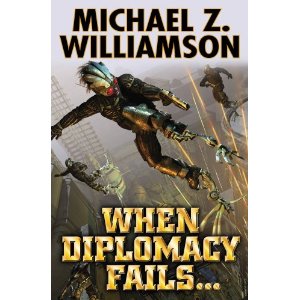When Diplomacy Fails …
Author: Michael Z. Williamson
Publisher: Baen Books
ISBN-10: 1-4516-3790-X
ISBN-13: 978-1-4516-3790-8
This is the seventh novel in Williamson’s Freehold interstellar action-adventure science-fiction series, which started with Freehold in 2003; or the third novel in his Ripple Creek Security subseries, which began with Better to Beg Forgiveness ….
The series is set about two hundred years in the future, in a human interstellar civilization in which most planets of the galaxy are divided among a tyrannical socialistic United Nations union (the villains), the lone-planet freedom-loving Freehold of Grainne (the heroes), and various worlds loosely aligned in a Colonial Alliance. After the first couple of novels, Williamson began concentrating on the exploits of the Freehold-based Ripple Creek Security Service, a commercial company of mercenary bodyguards who hire their services to the president of an independent planet in the throes of civil war (Better to Beg Forgiveness …, 2007), and the Richest Person in the Universe (Do Unto Others …, 2010). In other words, these novels are a s-f extrapolation of the private military companies such as Blackwater Security that contracted their services to the U.S. government in Iraq during the 2000s.
In this third novel, Ripple Creek is hired to guard and protect their traditional enemy! Well, politics has no personal enemies, and Ripple Creek has the reputation of being the best in the business. Ripple Creek is asked to assign its ace team of Alex Marlow, Jason Vaughn, Eleanora Sykora, Bart Weil, Horace Mbuto, and Aramis Anderson to protect the U.N.’s Bureau of State Minister Joy Herman Highland, a bureaucrat with very many enemies, both professional and personal.
There is little padding in Williamson’s prose. His team know each other well and are personal friends, but their conversation is heavy in shop talk; and the third-person narration is heavy in tech talk:
“[Alex] said, ‘We’re protecting a high-ranking UN bureau official out of system.’
Bart asked, ‘Are there specific threats?’
‘Some. We’ll be able to cover those during transport. We’re traveling together.’
Elke asked, ‘What restrictions do we have on weapons and gear, and rules of engagement?”
He understood she was asking if she could have explosives. ‘Unknown yet, but I do know the usual security contingent are armed.’
‘Then why us?’ Bart asked.
‘The threat level is perceived as higher than typical.’
‘So the free market is better at protecting the government than it is at protecting itself.’
‘Fundamentally, yes.’
‘Very amusing.’
‘We’re going to Mtali for the Environmental Summit and some other meetings.’
Bart raised his eyebrows. Yes, if they were up to date on newsloads, that pretty well gave away who the principal was.
‘Perhaps I will like this person,’ Elke said. ‘I respect ruthlessness.’” (p. 11)
and
“Their quarters were quite comfortable for the field. They had billets on par with officers or other high-end contractors: hard buildings, private rooms where enlisted personnel would have three to five, basic bunks and lockable closets. The problem, of course, was the weapons, which in theory were supposed to be secured whenever they were not on escort, which would mean a lot of back and forth to the armory. In practice, they usually left someone in the billet to watch things, armed. He also knew Aramis concealed a small pistol when out. He was sure Jason did, too, though he’d never seen it. He made do with a knife.” (p. 63)
For interstellar political reasons, the Environmental Summit is on a planet with a lot of factional religious groups fighting each other; so Alex and his teammates do not know whether they are protecting Highland from “incidental” Mtali religious violence, a specific assassination attempt against her by the partisans, an attempt by one of her political enemies back on Earth, or if they are there to guard her as just a publicity stunt. What they quickly find out is that, unlike their previous assignments where they were working with the full cooperation of their principals, Highland seems determined to make their job as hard as possible. Anti-terrorist security depends largely on secrecy and keeping as low a profile as possible. Highland wants maximum publicity for her political career and appearances, and even publicizes the names and portraits of her security team without their knowledge. The Ripple Creek team soon come to despise their current principal, who is clearly prepared to sacrifice some or all of them for her publicity’s sake.
Alex and the others are determined to not let this affect their professionalism. Besides their own self-honor, Ripple Creek’s reputation is at stake. But as the attacks against them increase, three patterns emerge. There are genuine non-deadly factional protests against Highland as a symbol of the U.N., assassination attempts against Highland presumably by her political rivals, and attacks designed to discredit the Ripple Creek Security team by causing civilian casualties that can be blamed on them. Alex and his teammates must become detectives to outwit and expose their adversaries, while protecting Highland despite her attempts to exploit them for political gain. The lengthy climax provides surprises and lots of military violence.
According to the “About the Author”, Williamson is an ex- military veteran of the U.S. Army and Air Force with considerable Middle Eastern experience, and a current weapons tester and reviewer for several firearms manufacturers. His professional expertise shows in this well-written military s-f series.






